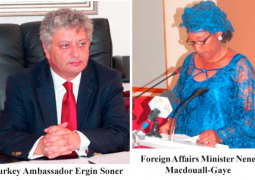Emmanuel Ina George, plaintiff, who instituted a claim against the defendant, Prime Bank (The Gambia) on Thursday testified before the Industrial Tribunal of the Kanifing Magistrates' Court.
The plaintiff's claim is a declaration that the dismissal by the defendant of the plaintiff was unlawful.
The plaintiff further is claiming a three-year basic salary for unlawful dismissal and bonus entitlements for the trading period of July 2009 to September 2010.
Mr George is also claiming general damages for breach of contract and interest at the rate of 25 per cent per annum from 13 July 2009 to date of judgement and thereafter statutory interest of 4 per cent to date of final liquidation.
Testifying before the tribunal, the plaintiff revealed that is a banker by profession and was working at the defendant's bank from 13 July 2009, as treasury dealer with a job description.
He adduced that in 2009, when he wanted to resign, he sent his resignation letter to the Human Resources.
He testified that on 14 May 2010, while still serving, he was called to a meeting by the managing director and the head of finance of the bank and was asked the reason for his resignation.
He told the court that he informed them that he was not allowed to work freely within the framework of his job description as a result he would not be able to achieve his target for a year.
According to him, "management resolved the issue and, after the meeting, wrote to him confirming its decision to allow him to operate freely within his job description."
At that juncture, the plaintiff's counsel, Moses Richards, applied to tender the said letter, which was identified by the plaintiff and was tendered and admitted into evidence.
"I was very satisfied with the aforesaid letter and I cancelled my resignation and continued to work," Mr George told the Tribunal, adding: "My performance was very good."
Still giving evidence, the plaintiff noted that on 23 September 2010, whilst his managing director was on leave, he faced another form of interference in his work from one Muhammed Maychaimes, who works at the marketing department of the said bank.
According to him, Mr Maychaimes consulted with him and said he had agreed to buy from a customer €200,000 at a rate of D41.20 per euro without his (the plaintiff's) approval.
He revealed that the role of the marketing was to give him (the plaintiff) the customer's contacts and he would decide the rate.
The plaintiff testified that he called the customer but could not negotiate with him, adding that the customer was not a licensed dealer, as he was purchasing in the street in Banjul and as such he could not buy from the customer as a dealer.
George indicated that he did not buy huge amount of money from unlicensed dealer, adding that Mr Maychaimes was adamant and asked him to buy from the customer, which he refused to do.
He asserted that the following day he (plaintiff) bought from a licensed dealer at a rate of D41.10.
Further testifying, he told the court that out of that transaction, the bank saves more than D20,000 as profit.
"On 24th September, 2010 the head of finance told me that she would be attending a workshop and would be very busy for the whole day. She told me that she would be calling me to update her about any transaction," the plaintiff indicated.
"I told her that I could not do that but would do any profitable transaction to the bank and await her signature, which she agreed to," the plaintiff added.
"On her arrival, the head of finance refused to sign some of the transactions, saying they were not customers of the bank."
The plaintiff revealed that she sent him an email letter which she copied to the Human Resources and Mr Maychaimes, adducing that the email was querying about a huge amount involved, in which he (the plaintiff) told the customer to open an account with the bank.
"Before I could respond to the email sent by the head of finance, Mr Maychaimes had sent me an email to explain why I did not buy from his customers," he told the court.
He revealed that he responded to the said emails and there was an exchange of emails between him and Mr Maychaimes.
When defence counsel Richards applied for the said emails to be tendered, they were tendered and admitted into evidence as an exhibit.
The case was at that juncture adjourned till 2 June 2011.
Read Other Articles In Article (Archive)
GHA members trained on food & beverage skill service
May 30, 2014, 11:32 AM



